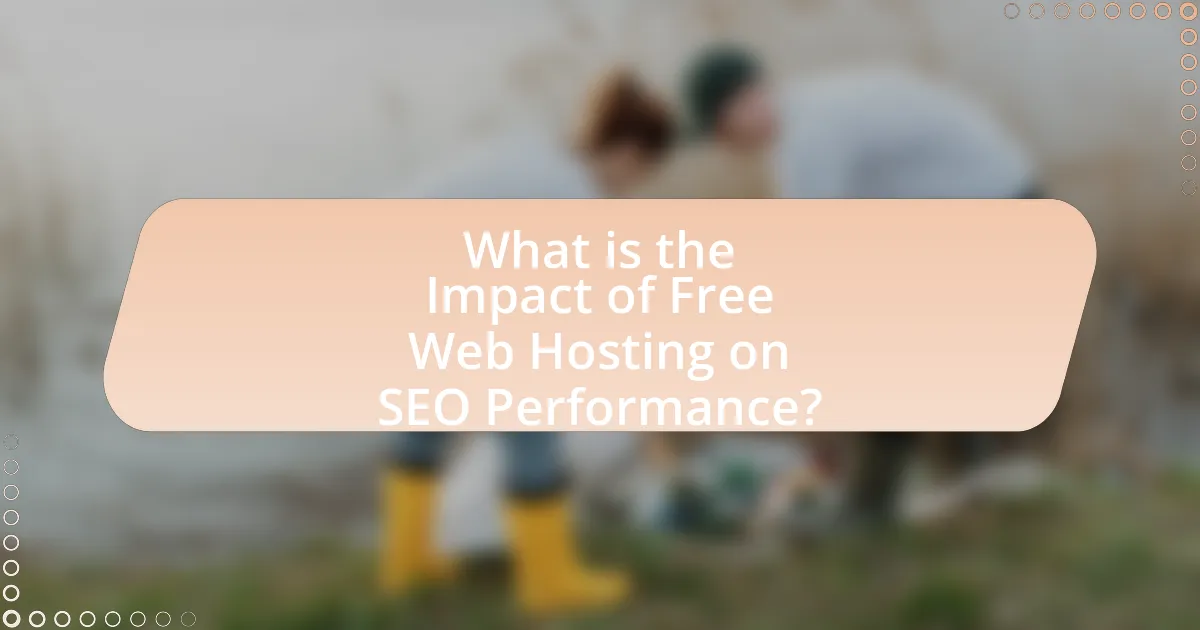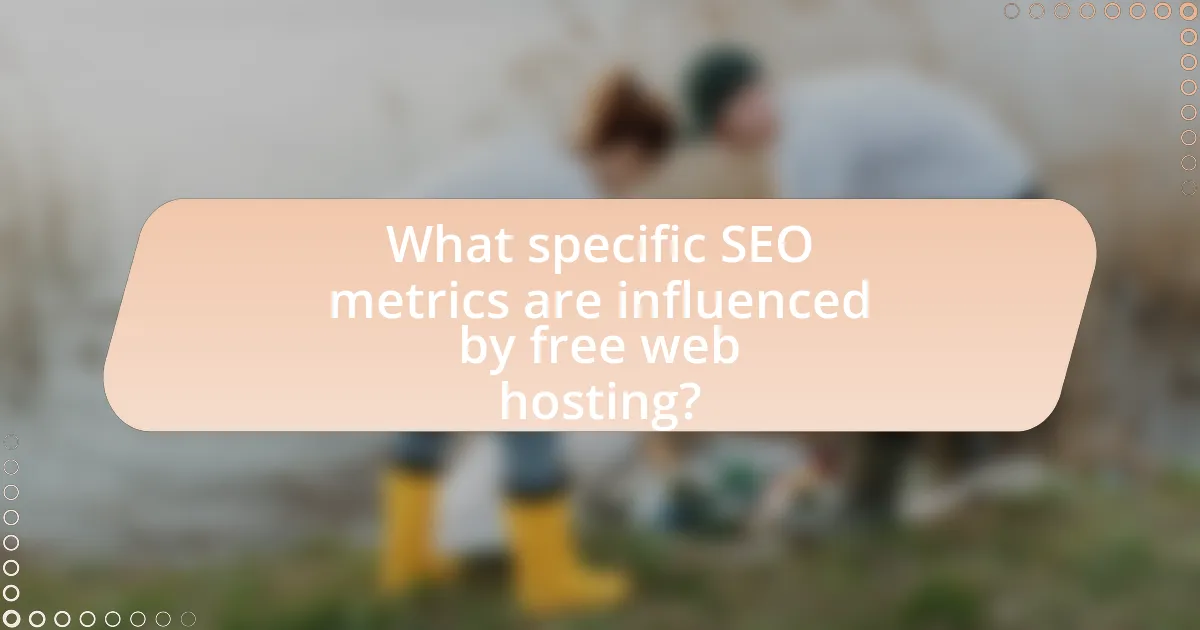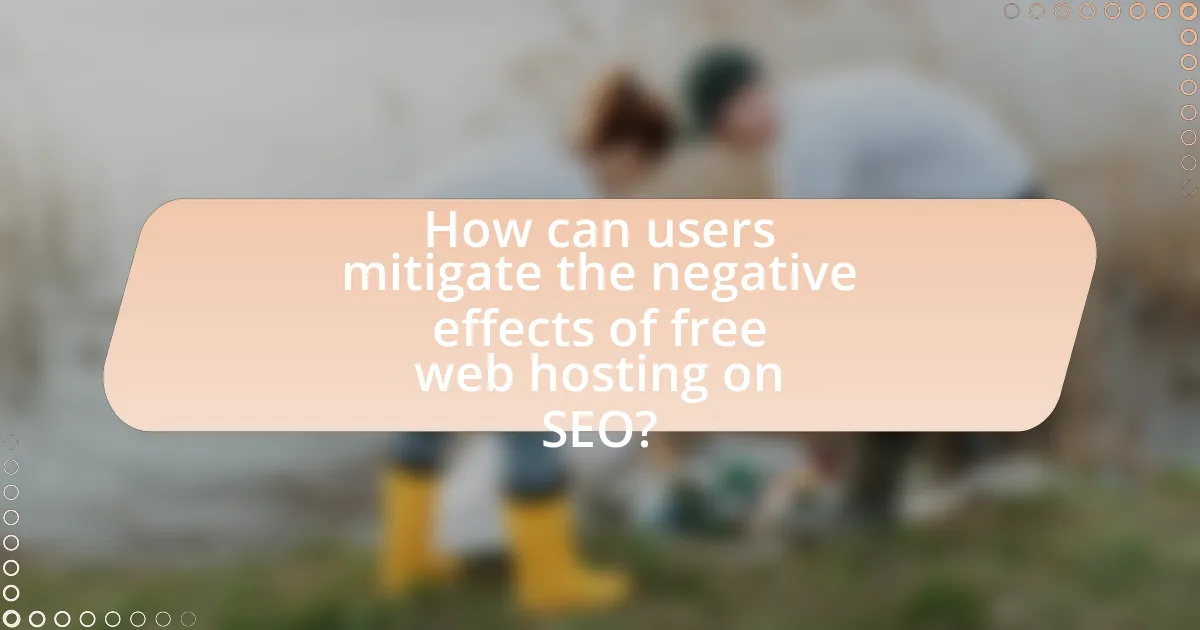The article examines the impact of free web hosting on SEO performance, highlighting how it negatively affects key factors such as site speed, uptime, domain authority, and security. It discusses the limitations of free hosting services, including slower loading times, higher bounce rates, and the use of subdomains, which dilute brand credibility. Additionally, the article explores the relationship between free hosting and website visibility, user experience, and mobile optimization, while also addressing potential drawbacks and strategies to mitigate these effects. Overall, it emphasizes the importance of reliable hosting for achieving optimal SEO outcomes.

What is the Impact of Free Web Hosting on SEO Performance?
Free web hosting negatively impacts SEO performance due to several factors. Websites hosted on free platforms often experience slower loading times, which can lead to higher bounce rates and lower search engine rankings. Additionally, free hosting services may impose restrictions on bandwidth and storage, limiting the site’s ability to handle traffic effectively. Furthermore, these services frequently use subdomains, which dilute brand authority and can hinder the establishment of a strong online presence. Research indicates that sites with faster load times and custom domains rank higher on search engines, reinforcing the detrimental effects of free hosting on SEO.
How does free web hosting influence website visibility?
Free web hosting negatively influences website visibility due to limitations in performance, reliability, and SEO features. Websites hosted on free platforms often experience slower loading times and higher downtime, which can lead to poor user experience and lower search engine rankings. Additionally, free hosting services typically lack essential SEO tools and customization options, making it difficult for website owners to optimize their content effectively. Research indicates that websites with faster loading speeds and higher uptime rates rank better on search engines, reinforcing the idea that free hosting can hinder visibility.
What are the key factors of SEO affected by free web hosting?
Free web hosting negatively impacts several key factors of SEO, including site speed, uptime, domain authority, and security. Site speed is often compromised due to limited server resources, leading to slower loading times, which can increase bounce rates and decrease rankings. Uptime is frequently unreliable with free hosting, resulting in frequent downtimes that can harm search engine visibility. Additionally, free hosting typically uses subdomains, which dilute domain authority and credibility, making it harder to rank well in search results. Lastly, security features are often minimal or nonexistent, increasing vulnerability to attacks, which can lead to penalties from search engines. These factors collectively hinder the overall SEO performance of websites hosted on free platforms.
How does website speed relate to free web hosting and SEO?
Website speed significantly impacts SEO performance, particularly when using free web hosting services. Free web hosting often results in slower loading times due to limited server resources and higher traffic on shared servers. According to Google, page speed is a ranking factor, meaning that slower websites can lead to lower search engine rankings. Additionally, a study by Akamai found that a 100-millisecond delay in load time can decrease conversion rates by 7%. Therefore, the relationship between website speed, free web hosting, and SEO is critical, as slower sites hinder visibility and user engagement, ultimately affecting search rankings.
What are the potential drawbacks of using free web hosting for SEO?
Using free web hosting can significantly hinder SEO performance due to several drawbacks. Firstly, free web hosting often comes with limited bandwidth and storage, which can lead to slow loading times; according to Google, page speed is a ranking factor, and slow sites can negatively impact user experience and search rankings. Secondly, free hosting services frequently display ads on websites, which can detract from user engagement and credibility, further harming SEO efforts. Additionally, free web hosts may not provide a custom domain, which is essential for building brand authority and trust with search engines. Lastly, these services often lack robust security features, making websites more vulnerable to hacks, which can lead to penalties from search engines.
How can limited resources in free hosting affect SEO rankings?
Limited resources in free hosting can negatively affect SEO rankings by causing slow website loading times and frequent downtime. Search engines prioritize user experience, and a website that loads slowly or is often unavailable can lead to higher bounce rates and lower user engagement. According to Google, page speed is a ranking factor, and studies show that a one-second delay in loading time can reduce conversions by 7%. Additionally, free hosting often lacks essential features like SSL certificates, which can further hinder SEO performance as secure sites are favored by search engines.
What security issues arise from free web hosting that impact SEO?
Free web hosting often leads to security issues such as malware infections, lack of SSL certificates, and shared IP addresses, all of which negatively impact SEO. Malware can cause search engines to flag a site as unsafe, resulting in lower rankings or removal from search results. The absence of SSL certificates can lead to warnings for users, decreasing trust and engagement, which are critical for SEO performance. Additionally, shared IP addresses can associate a website with spammy or malicious sites, further harming its credibility and search engine ranking. These factors collectively diminish a site’s visibility and authority in search engine results.
What advantages might free web hosting provide for SEO?
Free web hosting can provide advantages for SEO by offering accessibility and cost-effectiveness, which can lead to increased website traffic. Accessibility allows individuals and small businesses to create an online presence without financial barriers, enabling them to reach a wider audience. Increased website traffic can enhance search engine rankings, as search engines often prioritize sites with higher visitor numbers. Additionally, free hosting services may include built-in SEO tools or templates that help users optimize their content more effectively. These features can facilitate better indexing by search engines, further improving visibility.
Can free web hosting help in building backlinks?
Free web hosting can help in building backlinks, but its effectiveness is often limited. Many free hosting services allow users to create websites that can link to other sites, which can contribute to backlink generation. However, the quality and authority of these backlinks may be low, as search engines often devalue links from free hosting domains. For instance, backlinks from reputable domains carry more weight in SEO rankings compared to those from free hosting platforms. Therefore, while free web hosting can facilitate backlink creation, the overall impact on SEO performance may not be significant due to the potential lack of credibility associated with such links.
How does free web hosting facilitate experimentation for SEO strategies?
Free web hosting facilitates experimentation for SEO strategies by providing a cost-effective platform for testing various optimization techniques without financial risk. This allows marketers and website owners to implement and analyze different SEO tactics, such as keyword usage, content structure, and backlink strategies, in a real-world environment. The lack of financial investment encourages frequent testing and iteration, which is essential for identifying effective strategies. Additionally, free hosting services often come with built-in analytics tools, enabling users to track performance metrics and adjust their approaches based on data-driven insights.

What specific SEO metrics are influenced by free web hosting?
Free web hosting influences several specific SEO metrics, including site speed, uptime, domain authority, and user experience. Site speed is often negatively impacted due to limited server resources, which can lead to slower loading times; studies show that a one-second delay in page load time can reduce conversions by 7%. Uptime is another critical metric, as free hosting services may experience frequent downtimes, affecting site availability and search engine rankings. Additionally, domain authority can be lower for sites hosted on free platforms, as search engines may view them as less credible. Lastly, user experience is compromised due to ads and limited customization options, which can increase bounce rates and decrease engagement, further harming SEO performance.
How does free web hosting affect domain authority?
Free web hosting negatively affects domain authority due to factors such as limited resources, lack of control over server performance, and potential association with spammy domains. Websites hosted on free platforms often experience slower loading times and higher downtime, which can lead to poor user experience and lower search engine rankings. Additionally, free hosting services may not provide the same level of security and reliability as paid options, increasing vulnerability to hacks and malware, further harming domain authority. Research indicates that sites with higher uptime and faster load speeds tend to rank better, reinforcing the idea that free hosting can hinder SEO performance and, consequently, domain authority.
What role does user experience play in SEO metrics with free hosting?
User experience significantly influences SEO metrics, especially when utilizing free hosting. A positive user experience leads to lower bounce rates and higher engagement, which are critical factors for search engine rankings. For instance, Google considers page load speed, mobile-friendliness, and overall usability as essential components of its ranking algorithms. Free hosting often results in slower load times and limited customization options, which can detract from user experience. Consequently, websites hosted for free may struggle to achieve optimal SEO performance due to these user experience shortcomings.
How do search engines perceive websites hosted on free platforms?
Search engines generally perceive websites hosted on free platforms as less credible and lower quality compared to those on paid hosting services. This perception stems from several factors, including the prevalence of spam and low-quality content associated with free hosting services, which can negatively impact search engine rankings. Additionally, free hosting often lacks essential features such as custom domain names, which can further diminish a site’s authority and trustworthiness in the eyes of search engines. Studies have shown that websites with custom domains and reliable hosting tend to rank higher, as they are often associated with better user experience and content quality.
What is the relationship between free web hosting and mobile optimization?
Free web hosting often lacks the necessary features for effective mobile optimization, which can negatively impact user experience and SEO performance. Many free hosting services do not provide responsive design templates or adequate bandwidth, leading to slow loading times on mobile devices. According to Google, page speed is a critical ranking factor, and sites that do not load quickly on mobile may see a drop in search engine rankings. Additionally, free web hosting may not support essential mobile optimization tools, such as SSL certificates, which are important for security and user trust. Therefore, the relationship between free web hosting and mobile optimization is characterized by limitations that can hinder a website’s performance and visibility in search results.
How does mobile responsiveness impact SEO performance on free hosting?
Mobile responsiveness significantly enhances SEO performance on free hosting by improving user experience and engagement metrics. Search engines like Google prioritize mobile-friendly websites in their rankings, as mobile responsiveness reduces bounce rates and increases time spent on the site. According to Google’s mobile-first indexing approach, sites that are not optimized for mobile devices may experience lower visibility in search results. Additionally, a study by Statista indicates that over 50% of global web traffic comes from mobile devices, underscoring the necessity for mobile optimization to capture this audience effectively. Therefore, mobile responsiveness is crucial for maximizing SEO performance, especially on platforms with limited resources like free hosting.
What tools can be used to assess mobile optimization on free hosts?
Google Mobile-Friendly Test and GTmetrix are effective tools for assessing mobile optimization on free hosts. Google Mobile-Friendly Test evaluates how easily a visitor can use a page on a mobile device, providing insights on mobile usability and loading speed. GTmetrix analyzes page performance, including mobile optimization metrics like load time and responsiveness. Both tools are widely recognized in the industry for their accuracy and reliability in assessing mobile optimization, making them suitable for websites hosted on free platforms.

How can users mitigate the negative effects of free web hosting on SEO?
Users can mitigate the negative effects of free web hosting on SEO by choosing a reputable free hosting provider that offers better uptime and performance. Reliable free hosting services often provide faster loading times and less downtime, which are critical factors for SEO rankings. For instance, Google considers page speed as a ranking factor, and a study by Google found that 53% of mobile site visitors abandon a page that takes longer than three seconds to load. Additionally, users should optimize their website content for search engines by using relevant keywords, creating quality backlinks, and ensuring mobile-friendliness, as these practices can enhance visibility despite the limitations of free hosting.
What best practices should be followed when using free web hosting for SEO?
When using free web hosting for SEO, prioritize a custom domain name to enhance credibility and brand recognition. A custom domain improves trustworthiness, which is crucial for search engine rankings. Additionally, ensure that the hosting provider allows for SEO-friendly features such as customizable meta tags, clean URLs, and the ability to integrate analytics tools. Research indicates that websites with optimized meta tags and structured data have better visibility in search results. Furthermore, focus on site speed and mobile responsiveness, as these factors significantly influence user experience and search engine rankings. According to Google, page speed is a ranking factor, and mobile-friendliness is essential for user engagement. Lastly, regularly update content and maintain a consistent posting schedule to keep the site relevant, as fresh content is favored by search engines.
How can users optimize their content for better SEO on free hosts?
Users can optimize their content for better SEO on free hosts by focusing on keyword research, quality content creation, and proper on-page SEO techniques. Conducting thorough keyword research helps identify relevant terms that potential visitors are searching for, allowing users to incorporate these keywords naturally into their content. Creating high-quality, engaging content that provides value to readers increases the likelihood of backlinks and shares, which are crucial for SEO. Additionally, implementing on-page SEO techniques such as optimizing title tags, meta descriptions, and header tags enhances visibility in search engine results. According to a study by Moz, on-page SEO factors contribute significantly to ranking, emphasizing the importance of these practices even on free hosting platforms.
What alternative strategies can enhance SEO despite using free hosting?
Utilizing alternative strategies such as optimizing on-page SEO, leveraging social media, and focusing on quality content can enhance SEO despite using free hosting. On-page SEO techniques, including keyword optimization, meta tags, and header tags, improve search engine visibility. Social media platforms can drive traffic and engagement, indirectly boosting SEO rankings. Additionally, consistently producing high-quality, relevant content attracts backlinks and increases user engagement, both of which are critical for SEO success. According to a study by Moz, content quality and relevance are among the top factors influencing search engine rankings, demonstrating that these strategies can effectively counteract the limitations of free hosting.
What common mistakes should be avoided when using free web hosting for SEO?
Common mistakes to avoid when using free web hosting for SEO include neglecting to optimize site speed, failing to secure a custom domain, and overlooking mobile responsiveness. Site speed is crucial for user experience and search rankings; free hosting often results in slower load times due to shared resources. A custom domain enhances credibility and brand recognition, while free subdomains can appear unprofessional and may not rank well. Additionally, many free hosting services do not provide mobile-friendly templates, which can negatively impact SEO as mobile usability is a ranking factor. These mistakes can hinder visibility and performance in search engine results.
How can neglecting site maintenance impact SEO on free hosting?
Neglecting site maintenance can significantly harm SEO on free hosting by leading to slow loading times, broken links, and outdated content. These factors negatively affect user experience and search engine rankings. For instance, Google prioritizes fast-loading websites; a study by Google found that a one-second delay in loading time can reduce conversions by 7%. Additionally, broken links can result in a higher bounce rate, which signals to search engines that the site is not reliable. Regular updates and maintenance are essential to ensure optimal performance and maintain visibility in search engine results.
What are the risks of relying solely on free hosting for long-term SEO success?
Relying solely on free hosting poses significant risks to long-term SEO success, primarily due to limitations in performance, reliability, and control. Free hosting services often have slower loading times, which negatively impact user experience and search engine rankings, as page speed is a critical ranking factor. Additionally, these services may impose restrictions on bandwidth and storage, leading to potential downtime or site unavailability, further harming SEO efforts.
Moreover, free hosting typically lacks essential features such as custom domain names and SSL certificates, which are important for building credibility and trust with both users and search engines. The absence of these features can result in lower search visibility and reduced organic traffic. Furthermore, free hosting providers often display ads on hosted sites, which can detract from user experience and lead to higher bounce rates, negatively influencing SEO performance.
In summary, the risks associated with free hosting include poor site performance, lack of essential features, and potential downtime, all of which can severely hinder long-term SEO success.
What practical tips can improve SEO performance on free web hosting?
To improve SEO performance on free web hosting, focus on optimizing website content, enhancing site speed, and utilizing effective keyword strategies. Optimizing website content involves using relevant keywords naturally within titles, headings, and body text, which helps search engines understand the site’s purpose. Enhancing site speed can be achieved by compressing images and minimizing code, as faster-loading sites rank better; Google reports that a one-second delay in load time can reduce conversions by 7%. Utilizing effective keyword strategies includes researching long-tail keywords that have lower competition, making it easier to rank higher in search results. These practical tips can significantly enhance SEO performance, even on free web hosting platforms.